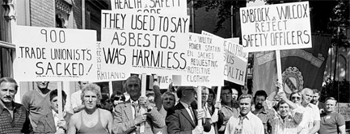 Derek Maylor, NW BT Unions H&S Co-ord member and Health & Safety Officer (Telecom section) of the CWU's Grter Mersey Amal Branch; reports on this Asbestos Conference event which he attended via video conference on 27th November:
Derek Maylor, NW BT Unions H&S Co-ord member and Health & Safety Officer (Telecom section) of the CWU's Grter Mersey Amal Branch; reports on this Asbestos Conference event which he attended via video conference on 27th November:
The picture below is a traditional old image of workers protesting about asbestos but despite the banning of asbestos in the UK in 1999, the latest statistics continue to show that the dangers of asbestos are still with us and are likely to be for the foreseeable future.
Today, asbestos is still used in large quantities in many parts of Asia, Eastern Europe and South America, while controlled use is still permitted in the USA and Canada.
Asbestos victims support groups are essential in support of victims around the country.

Prof. Sanjay Popat spoke about research into mesothelioma;
- • It remains an incurable disease.
- • We understand little about how asbestos changes the cells to make them malignant.
- • Current treatments are only moderately effective.
- • The UK has significant levels of historical asbestos meaning mesothelioma will continue to be a major disease burden for many years.
 With Covid in the news a lot has been spoken about medical research.
With Covid in the news a lot has been spoken about medical research.
Traditionally there was pre-clinical research such as on animals;
phase 1 trials treatment on handful of patients looking for safety effects;
phase 2 trials 50/100 patients looking for signals that the drug works;
phase 3 trials comparing standard treatment to new drug; regulatory approval; NHS funding and cost effectiveness.
There are trials continually ongoing so look at the mesothelioma website (adress below) for the the latest information.
The pandemic has highlighted the impact on UK healthcare when messages have been put out too hastily.
The stay at home message was so adhered to initially that there was a reduction in GP referrals and a reduction in
A & E attendance. Routine care was reduced meaning less cancer screening, prioritising of urgent cases became hugely important. There were delays in diagnostics and biopsies took more time, then to make it worse there was a reduced workforce within the NHS. Sadly, this meant that there was an increase in death form undiagnosed cancer and an increase in advanced cancer at diagnosis.
Abestos related diseases require a series of biochemical changes taking place over a number of years following the initial "irritation" of cells in the lung by asbestos fibres. Individual responses vary, why does the fibre affect one person in the room and not another?
There will be a huge drop in research charity funding – private donations have plummeted, and it is expected that companies funding will do so as well next financial year. Analysis by Public Policy Research says that the UK could lose up to £7.8 billion of investment in research by 2027, UK charities set to lose 38% of fundraising income this year and 25% next year.
Unexpectedly there have been some new outcomes in response to the Coronavirus pandemic:
- • A move to remote consultations,
- • Modified treatment to reduce hospital visits,
- • Workers and public recognition on use of PPE,
- • Streamlined processes for peer & ethical review of research,
- • Ultra-rapid turn round of research approvals,
- • Prioritising urgency of research irrelevant of funding.
 This will have a knock-on effect on research into mesothelioma which is critical to many patients. Time and cost reviewed, less funding in short term, there have been improvements in research methodology which will be taken on, expected that research will recover at a fast pace with public support.
This will have a knock-on effect on research into mesothelioma which is critical to many patients. Time and cost reviewed, less funding in short term, there have been improvements in research methodology which will be taken on, expected that research will recover at a fast pace with public support.
Rob Miguel from Unite talked about members who have been in to contact with asbestos at various Ministry of Defence sites and also those who had worked on Sea King helicopters.
Unite campaigned for the MoD to contact the 1000 workers who had worked on them since 1969 when they knew that there was a lot of asbestos, and that any such components were removed asap. Foreign buyers of Sea Kings were also contacted. Recently at Heathrow Airport a refurbishment has highlighted that there is a widespread asbestos that had been missed on previous surveys.
Unions, including the CWU, are organising to explore designing and running a campaign to eradicate asbestos from public buildings. This would be similar to the Joint Union Asbestos Committee which has been ongoing since 2010 – this was to raise awareness of asbestos in schools and other education sector buildings.
 Nick Dearden, Director of Global Justice Now – we have concerns over trade deals post Brexit – they will be largely about regulations and a lot of what we have are to protect workers and the environment. In trade negotiations (such as with the USA) will be about perceived barriers to free trade and money leading downward trends in health safety and environment if there is a perceived cost.
Nick Dearden, Director of Global Justice Now – we have concerns over trade deals post Brexit – they will be largely about regulations and a lot of what we have are to protect workers and the environment. In trade negotiations (such as with the USA) will be about perceived barriers to free trade and money leading downward trends in health safety and environment if there is a perceived cost.
The US regulations are far lower standards than the UKs, there is a wealth of 1,300 chemical components banned from use in cosmetics in the UK and in the USA there are just 11 banned. There are lots of other similar concerns including the permitted use of asbestos.
Resources:
- • TUC: Asbestos - time to get rid it - https://bit.ly/2V4MpKS
- • Meso support - www.mesothelioma.uk.com
- • Asbestos in schools - https://toxicschools.org.uk
- • Global Justice - www.globaljustice.org.uk
- • Action Mesothelioma www.actionmeso.org